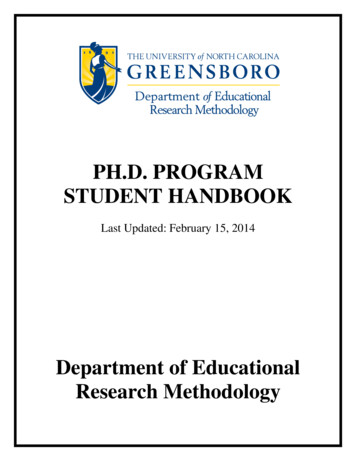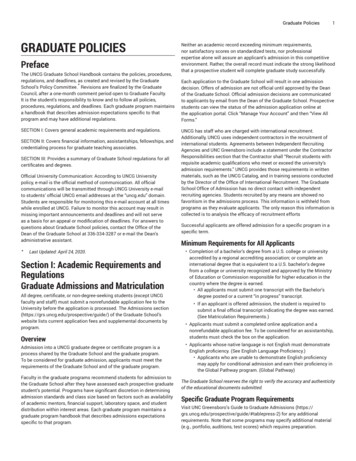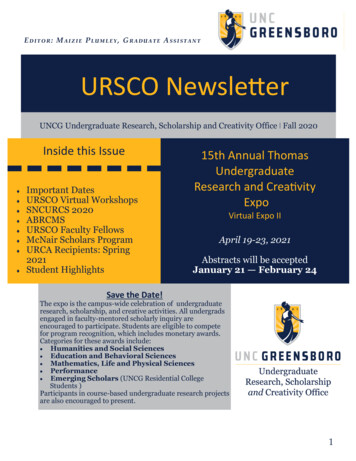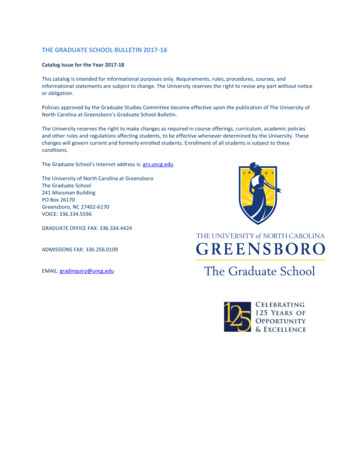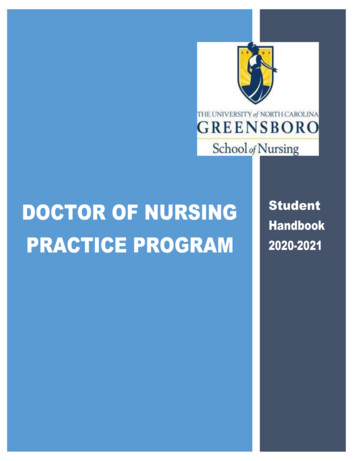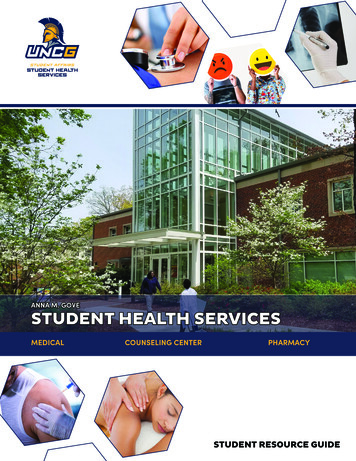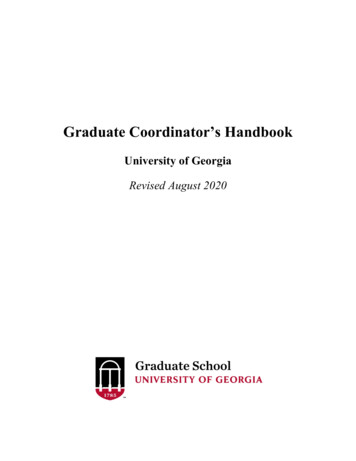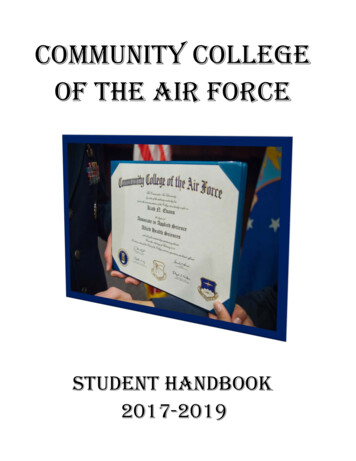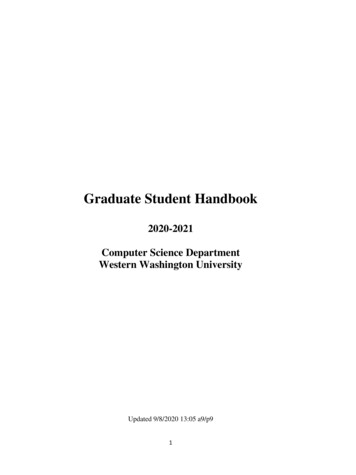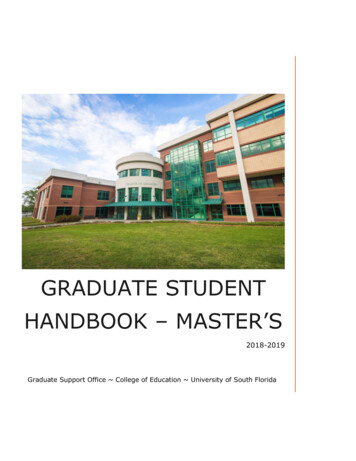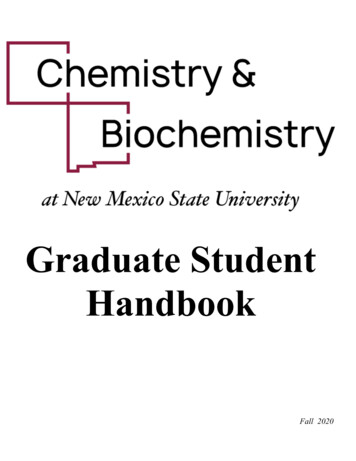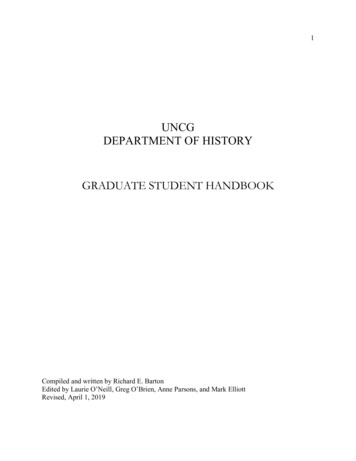
Transcription
1UNCGDEPARTMENT OF HISTORYGRADUATE STUDENT HANDBOOKCompiled and written by Richard E. BartonEdited by Laurie O’Neill, Greg O’Brien, Anne Parsons, and Mark ElliottRevised, April 1, 2019
2I. General InformationA. General DisclaimerThe material presented in this Handbook is purely informational. That is, it is not meantto contradict or overturn policies presented in the official Graduate Bulletin. Students are boundby the regulations presented in the Bulletin published in the year they enter a graduate programin UNCG. Material found in this Handbook may clarify, supplement, and sometimes expandinformation found in the Bulletin, but it can in no way alter official UNCG Graduate Schoolpolicy (as expressed in the Bulletin). All students are strongly recommended to carefully read theBulletin, particularly the “Academic Regulations” chapter and the Departmental listing forHistory. If something written in this Handbook is found to conflict with the Bulletin, thediscrepancy should be brought to the attention of the DGS, for the Bulletin’s policies will alwaysserve as the final recourse.B. Degree ProgramsThe Department of History at UNC Greensboro (UNCG) offers two degrees at thegraduate level: a Master of Arts (M.A.) and a Doctor of Philosophy (Ph.D.) degree withconcentration in U.S. History.1. M.A. Degree: UNCG offers two tracks at the Master’s level: a Master’s in History and aMaster’s in History with concentration in Museum Studies. Depending on theconcentration, the degree requires 30-36 hours of coursework. The Graduate Schoolrequires that all requirements for the M.A. be completed within five years. Full details onthese concentrations may be found below.2. Ph.D. Degree: UNCG will only consider applicants in U.S. history who already hold anM.A. in History. Applicants should take care to ensure that their academic andintellectual interests are well suited to the interests of the UNCG faculty in U.S. history.Doctoral students complete 33-39 hours of coursework (not including dissertation hours)and produce a major piece of scholarship (the dissertation). The Graduate School requiresthat all requirements for the Ph.D. be completed within seven years. Full details may befound below.C. Director of Graduate Studies, Director of Public History and the GraduateCommittee1. Director of Graduate Studies (DGS): The DGS is appointed by the Head of theDepartment of History. He/she leads the departmental Graduate Committee (see below)and is the point person for all program, policy, and personnel issues concerning graduatestudents. The DGS also fields inquiries from prospective applicants and engages inrecruiting endeavors. All non-Public History graduate students are required to see theDGS once a semester for academic advising.
32. Director of Public History (DPH): The DPH is appointed by the Head of the Departmentof History to administer the MA concentration in Museum Studies. He/she maintains apermanent seat on the departmental Graduate Committee, and is the point person for allinquiries concerning the Museum Studies concentration. All Museum Studies studentsare required to meet with the DPH at least once a semester for academic advising. TheDPH is also instrumental in helping to locate and arrange internships for Museum Studiesstudents.3. The Graduate Committee: The Graduate Committee is a standing departmentalcommittee of the tenured and tenure-track faculty in the History Department. Permanentmembers of the Graduate Committee include the DGS, who chairs it, the Director ofPublic History, and the Department Head. Other members of the faculty are appointed bythe Department Head. The committee’s responsibilities include the following:supervision and review of all matters pertaining to all graduate degree programs(including admission requirements, program structure, requirements, and so forth);annual admission decisions for all graduate programs; nominations for graduate studentawards, scholarships, and assistantships; and consideration of all extraordinary graduatestudent requests.D. The Graduate SecretaryLaurie O’Neill is the current graduate secretary. In addition to the DGS, she is a resourceof first recourse for practical questions about the program. She also handles all paperworkconcerning assistantships. Her office is MHRA 2103, and her extension is 256-1385. Her emailis lponeill@uncg.edu.E. Important Web Sites1. The Graduate School: http://grs.uncg.edu-important for application information, general policies, and so forth-take special note of the ‘Forms’ sub-link:https://grs.uncg.edu/forms/2. UNCG’s History Department: http://his.uncg.edu-important for graduate information, forms, course information, faculty profilesII. Admission Procedures and RequirementsA. Application DeadlinesThe Department only admits students for matriculation in Fall semesters (that is, it doesnot admit students starting in Spring or Summer). The deadlines for such applications are asfollows:
4M.A. program:Ph.D. program:February 1January 15(for Fall admission)(for Fall admission)B. Admissions RequirementsApplicants should consult both the Graduate School website and the History Departmentwebsite for information about applications (for URLs, see section I above).All admissions materials should be submitted online through the Graduate School, notdirectly to the History Department.1. M.A. Admissions:o Application and fee (information and forms available at the Graduate School site)o Transcripts from all institutions of higher learningo GRE scores (must be current, that is, taken within the past five years)o Three letters of recommendation (letters from professors are strongly preferred)o Personal statement (length should be approximately two pages)o Resumé2. Ph.D. Admissions:o Application and fee (information and forms available at the Graduate School site)o Transcripts from all institutions of higher learningo GRE scores (must be current, that is, taken within the past five years)o Three letters of recommendation (letters from professors are strongly preferred)o Personal statement (length should be approximately two pages)o Writing sample (length should be approximately twenty-five pages)o n.b.: applicants must already possess an M.A. in History by the time ofenrollment, and should preferably have gained that M.A. in U.S. historyC. Schedule of Admissions DecisionsAll applications are read by the Graduate Committee during the weeks following theapplication deadlines (January 15 or February 1). Initial recommendations for the Ph.D. programare made in mid-February, while initial recommendations for the M.A. program come in midMarch. Students may be accepted with funding, accepted without funding, placed on a waitinglist, or rejected. Applicants who are not immediately accepted (or who do not receive fundingoffers immediately) should not lose all hope; it is very common for wait-listed students to beoffered spots in either program (or an assistantship) later in the admissions season.D. Advice to ApplicantsGraduate work in history, whether at the M.A. or Ph.D. level, requires relatively narrowconcentration on at least one specific area of history. Personal statements should thus seek to linkthe applicant’s specific intellectual/research interests to those of the current faculty in the UNCGDepartment of History. This may be accomplished through consultation of the faculty profiles
5available online on the History Department website, or through direct contact with the DGS orindividual faculty members. Applicants who announce in their personal statements their intentionto study a type or area of history that is not one of the specialties of one of the current faculty areunlikely to be admitted. This advice is particularly true for Ph.D. applicants.The Department currently does not require a minimum GRE score for admittance. Sincethe Graduate Committee examines each application holistically, GRE scores are only onecomponent of a successful application. Clearly applicants who earn higher scores may wellappear more impressive to the Committee, but mid-level GRE verbal scores provide noautomatic impediment to matriculation at UNCG.E. International StudentsApplicants who are not US citizens should consult the relevant information on theGraduate School web page tml).III. Costs and Financial AssistanceA. Costs of Graduate SchoolCosts of Graduate School come in the form of tuition and fees. North Carolina residentspay in-state tuition, while out-of-state (non-resident) students pay both the in-state tuition and anout-of-state surcharge.For estimated costs: see http://grs.uncg.edu/financial/estimated-cost/B. ResidencyStudents who are not legal residents of North Carolina are strongly encouraged toestablish legal residency here. Definitions of residency are made by the University, not theDepartment. Students should consult the following website for information on how to establishlegal residency in North Carolina: https://ncresidency.cfnc.org/residencyInfo/C. Graduate Assistantships (for M.A. students)The History Department awards limited funding to M.A. students in the form of GraduateAssistantships (GA-ships). Applicants are automatically considered for assistantships, which areawarded based on merit at the judgment of the Graduate Committee and on the availability offunding. While the Department makes every effort to ensure that M.A. students who receiveassistantships are funded for two years, the vagaries of the university budget are such that wecannot guarantee renewal. Students who are not funded in their first year are unlikely to befunded in the second year, except in exceptional and/or unusual circumstances.Graduate Assistants are assigned to individual professors (or to the office) to assist aparticular professor with teaching, professional business or research. Duties will not exceed 15hours per week. Students on assistantship must enroll in at least 6 hours of graduate level coursesand maintain a GPA of at least 3.0 each semester.
6D. Teaching Assistantships (for Ph.D. students)Teaching Assistantships (TA-ships) are awarded to doctoral students as their primarysource of departmental funding. All doctoral applicants are automatically considered for TAships, and it is part of the doctoral program’s core philosophy that doctoral students learn tobecome expert teachers. As a result the department is normally able to offer most admitteddoctoral students a TA-ship, and is committed in principle (although it cannot guarantee it) toextend that TA-ship for four years.T.A.s are assigned to one of the large lower-division lecture courses offered by thedepartment each semester. In such courses the professor lectures two days a week, while theT.A.s conduct discussion sections (two per TA) on the third. T.A.s are also responsible forgrading all the students in their sections. Workload is defined as 15-20 hours per week. Studentson assistantship must enroll in at least 6 hours of graduate level courses and maintain a GPA ofat least 3.0 each semester.E. Tuition WaiversThe Department has access to a very limited number of tuition waivers which it uses torecruit and assist its top applicants. Tuition Waivers are assigned by the General Assembly toeach campus of the University of North Carolina, where they are then parceled out amonggraduate programs. This means that as much as the History Department would like to create itsown waivers, we are limited by the numbers assigned to us by the College of Arts and Sciences.Tuition Waivers come in two sorts, In-State and Out-of-State. An In-State Tuition Waiver(ISTW) covers in-state tuition, but not student fees. An Out-of-State Tuition Waiver (OSTW)covers ONLY the out-of-state tuition surcharge, and not regular in-state tuition (and not studentfees). OSTWs and INSTWs may be bundled together. The best departmental funding package anout-of-state student can receive is thus an assistantship, an ISTW and an OSTW; such a studentwould only pay student fees. The best departmental funding package an in-state student couldreceive is an assistantship and an ISTW; such a student would still have to pay student fees. Astudent must be awarded an assistantship first (either a Graduate Assistantship or a TeachingAssistantship) to be eligible to receive any form of tuition waiver.Given the growth in the number of graduate programs at UNCG and the NC Legislature’sreluctance to grant new waivers, the number of waivers available to the History Department isfairly limited. Preference is given to doctoral students and to select M.A. applicants.F. Health InsuranceAll graduate students at UNCG must demonstrate that they possess health insurance. Insome cases, the Graduate School may cover the costs of health insurance. See the following sitefor more information http://grs.uncg.edu/health-insurance/.G. Summer AssistantshipsSummer assistantships are sometimes awarded by the Graduate School (not the HistoryDepartment), although the History Department ranks and forwards student applications to theGraduate School for consideration. Summer Assistantships provide money (somewhere between
7 1500-2000) to enable students to perform a set of specific research goals deemed essential totheir degree. Note that these assistantships are quite different from GA-ships or TA-ships, as theydo not require that the student work for the university. In essence, they are scholarships awardedto accomplish specifically outlined research programs. Preference is usually given to doctoralstudents, although M.A. students who can demonstrate a strong need are encouraged to apply.Further information on these awards is forthcoming each year from the Graduate School and theDepartment DGS.H. Dissertation Fellowships (Ph.D.)The Department has (since 2006) awarded Allen W. Trelease Graduate Fellowships andRichard G. Lane Memorial History Fellowships to doctoral students each academic year. Anydoctoral student who has advanced to candidacy is eligible for the competitive award. Althoughthere are no stipulations on their use, it is to be hoped that recipients will use the money to travelto archives, attend conferences, and/or support the process of writing the dissertation. A call forapplications is made each spring for the following year’s awards. Applications must include aletter of recommendation/nomination written by the dissertation director, and an analyticaldescription of the dissertation no more than 2 pages in length. The best descriptions will brieflyoutline the topic before discussing some or all of the following: the contribution of thedissertation to the field, any relevant methodological issues, the location and nature of thesources to be used in the dissertation, and/or the proposed time line for completing thedissertation.I. UNCG Fellowships, Grants, Scholarships, etc.UNCG possesses a fairly long list of fellowships and scholarships for which incomingstudents are nominated by the admitting department. This means that applicants need do nothing;the DGS and DPH will nominate incoming students for relevant awards, some of which arefellowships (i.e., ‘free money’ which requires no service to the department) and some of whichare supplements to assistantships. As these awards are open to the entire university, they arequite competitive. Some information may be found at the following .J. Travel AwardsGraduate Students looking for assistance for travel to academic conferences (or, perhaps,to archives) should consult the GSA (Graduate Student Association of UNCG) and/or the DGSof the History Department. The former has a limited amount of money which is apportioned on afirst-come, first-served basis beginning in the fall (apply early!). The latter will announce tostudents the availability of departmental funds to be awarded to students presenting papers atconferences. The departmental Graduate Committee will collect and evaluate applications forthose funds which the Department Head makes available to it. Any student who expects to bereimbursed for travel funding must meet with Kristina Wright, the Office Manager, in theHistory office before making travel arrangements and payments. Graduate students working onresearch topics related to women and/or gender should also consult the Women's and Gender
8Studies program at UNCG that has fellowships available to support conference awards/K. National Grants and FellowshipsAdmitted students should consult with relevant faculty members about grants andfellowships available in their disciplines. The Office of Financial Aid(http://fia.uncg.edu/searches/) lists a few sources of funding, but the American HistoricalAssociation has a much better listing at sand-fellowships (the fullest database is limited to members - a good excuse to join the AHA).L. Financial AidThe Department does not advise students about financial aid. Students interested infederal sources of financial aid should consult the Office of Financial Aid (http://fia.uncg.edu/).Information about full-time status can be found at https://grs.uncg.edu/current/faqsfulltime/.IV. Academic Requirements for the Degree of Master of Arts inHistory (M.A.)The Master of Arts in history requires 30 semester hours. Students must pass a languageexamination or take an extra three hours of course work. Upon entering the program, studentswill develop an individualized plan of study with prior approval from the Director of GraduateStudy. They will develop three fields of study based upon the specializations of their threemember faculty committee. Any of our faculty members with graduate faculty status may serveas the main advisor for an M.A. committee. Such a framework allows our students maximumflexibility in pursuing research topics of greatest interest and applicability to their future goals.The M.A. in history offers excellent preparation for those planning to teach history atcommunity colleges and secondary schools and provides a solid foundation for those who go onto Ph.D. programs or who find employment in government and business. The M.A. improvesanalytic, research, and writing skills.Application and AdmissionIn addition to the application materials required by The Graduate School, applicants mustsubmit a Personal Statement. A resume or c.v. is encouraged. A writing sample is optional. Thedeadline to apply is February 1. Qualified applicants must present an approved undergraduatebackground (though not necessarily a major) in history. At least nine credit hours of advancedundergraduate history is required.Degree Requirements in HistoryRequired Courses (12 hours)HIS 510 Historiography (3)
9HIS 709 Introductory Research Seminar (3)HIS 703 Seminar in History (3)*HIS 704 Seminar in History (3)**Or students will write a Thesis (see below), HIS 699 (6)Colloquia (9 hours)Students will complete three courses (9 hours) from the following colloquia:HIS 701 Colloquium in American History before 1865 (3)HIS 702 Colloquium in American History since 1865 (3)HIS 705 Colloquium in European History before 1789 (3)HIS 706 Colloquium in European History since 1789 (3)HIS 710 Colloquium in the Atlantic World (3)HIS 716 Colloquium in World History (3)Electives (9 hours)Students will complete three courses (9 hours) from remaining graduate-level courses inHistory, including additional colloquia, chosen in consultation with their faculty committeemembers and the Director of Graduate Study. One elective course (3 hours) may be taken at thegraduate level in a related department or program, with approval of the Director of GraduateStudy.Language RequirementMany areas of historical research require proficiency in a foreign language. Students whointend to concentrate in such areas are encouraged to pass the written language examination,administered by the Department. In lieu of the language examina
Apr 01, 2019 · by the regulations presented in the Bulletin published in the year they enter a graduate program in UNCG. Material found in this Handbook may clarify, supplement, and sometimes expand information found in the Bulletin, but it can in no way alter official UNCG Graduate School policy (as

